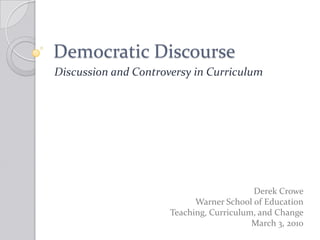
Democratic Discourse
- 1. Democratic Discourse Discussion and Controversy in Curriculum Derek Crowe Warner School of Education Teaching, Curriculum, and Change March 3, 2010
- 2. Overview A Democratic Education Democracy, Discussion, and Controversy in the classroom Addressing Anticipated Concerns Conclusion Questions March 3, 2010 2 Democratic Discourse Curriculum
- 3. A Democratic Education Proactively encourages engagement in our current society Political realm is unimportant Honestly addresses the world outside the classroom That world is too “taboo” Frames the politics as dynamicand transformative Everyone agrees on the nature of public good March 3, 2010 3 Democratic Discourse Curriculum
- 4. A Democratic Education Rests on the some simple assumptions: The good of every human being is intrinsically equal to that of any other (Dahl, 1998) As citizens and members of our democracy, we can work to build a better society What does a better society look like?? March 3, 2010 Democratic Discourse Curriculum 4
- 5. A Democratic Education In the national debate about a serious issue, it is the expression of the minority’s viewpoint that most demands the protection of the First Amendment. Whatever the policy may be, a full and frank discussion of the costs and benefits of [a decision regarding any controversial issue] is far wiser than suppression of speech because it is unpopular. March 3, 2010 Democratic Discourse Curriculum 5 “ ” - Justice Stevens, 2007
- 6. Democracy, Discussion, and Controversy in the classroom What is a discussion? Dialogue between or among people Approach to constructing knowledge Many reasons, many ways What is a controversial issue? A question of public policy that sparks significant disagreement Multiple, strikingly different legitimate answers March 3, 2010 Democratic Discourse Curriculum 6
- 7. Democracy, Discussion, and Controversy in the classroom Example controversial issues Should public money be used for school tuition vouchers for students who attend private schools? Should the U.S. immediately initiate a withdrawal from Iraq? Should our city have a curfew for youth? Should our states pass a law legalizing marriage between members of the same sex? What should the international community do to combat terrorism? March 3, 2010 Democratic Discourse Curriculum 7
- 8. Democracy, Discussion, and Controversy in the classroom Discussion builds political tolerance, political tolerance builds democracy 23% of adult US population engages in cross-cutting political talk (Mutz, 2006) Aversion to conflict causes low levels of political engagement (Hibbing and Theiss-Morse, 2002) Discussion produces learning Talking about issues actually builds knowledge (Fishkin & Farrar, 2005) March 3, 2010 8 Democratic Discourse Curriculum
- 9. Democracy, Discussion, and Controversy in the classroom Why the classroom? Living Environment Homogenization of communities “ideological amplification” (Schkade, Sunstein, & Hastie, 2006) Media Shouting heads on TV & radio, self selection on the internet Schools Greater range of opinions and viewpoints March 3, 2010 Democratic Discourse Curriculum 9
- 10. Addressing Anticipated Concerns What about curriculum content? What about state testing? How much/who will this cost? Should teachers make their views known? March 3, 2010 10 Democratic Discourse Curriculum
- 11. Content and Testing Students who learned about AND discussed issues scored higher than students who just learned ( J. Johnston, Anderman, Milne, Klenck, & Harris, 1994) Start with elective classes March 3, 2010 11 Democratic Discourse Curriculum
- 12. Costs? Professional Development Choosing a discussion model Develop new lessons that prepare for discussions through content Assessment Teacher Support School-wide endorsement of the use of issue discussion Teacher study groups that meet throughout the year March 3, 2010 12 Democratic Discourse Curriculum
- 13. Teacher’s opinions? Nearly half of teachers and students surveyed thought teacher opinions would sway student’s views Only 23% of students felt their views would be affected (Hess, McAvoy, Smithson, & Hwang, 2008) No statistical relationship between teacher disclosure and student’s views Disclosing can lower participation Disclosing can result in students thinking about their own views Disclose after discussion? March 3, 2010 13 Democratic Discourse Curriculum
- 14. Conclusion “Americans in Favor of Hearing the Other Side” What are the consequences of NOT hearing the other side? Tolerance isn’t enough “Resist our impulse to demand that what young people in schools experience reflect our own views” – Diana Hess March 3, 2010 14 Democratic Discourse Curriculum
- 15. Democracy involves public discussion of common problems, not just the silent counting of individual hands. March 3, 2010 Democratic Discourse Curriculum 15 “ ” - Jane Mansfield, 1991
Editor's Notes
- disconnect between IN school and OUT of school they are inextricably linkedStudents are members of society – some can already voteGet rid of the REAL world idea – students, like us, are in a world that is as real now as it ever will be Ignoring/supressing/denying the role of controversial issues…
- (seemingly) simple I aim to show you that a better society is one where that question is never answered from one perspective, but addressed equally by manyCitations: page 15
- Citation: page 12
- Multiple definitions, some common features of a discussion are: - approach to constructing knowledge based in the idea that the most powerful ideas are produced when people are equally expressing and listening
- WHY DISCUSSION?Society without political tolerance deprives some of their right to influence the political agendaCross-cutting simply means talking with someone who holds views that are different than your ownAVERSION: Entertainment vs. PoliticsKNOWLEDGE:- familiarizes you with legitimate rationales for opposing views - legitimizes and normalizes political conflict
- Pg 167
- Teacher skill matters to the success of issue discussion in schoolsCitation: page 23
- Citation – page 173We must proactively teach future generations how to engage in true democratic participation not only by facilitating the discussion of controversial issues in our schools, but also by providing resources so students can use their understanding of the world to help shape the society we are all a part of
- Questions?
